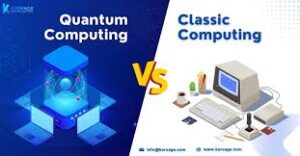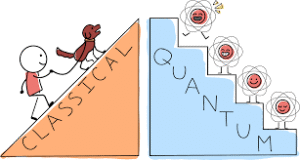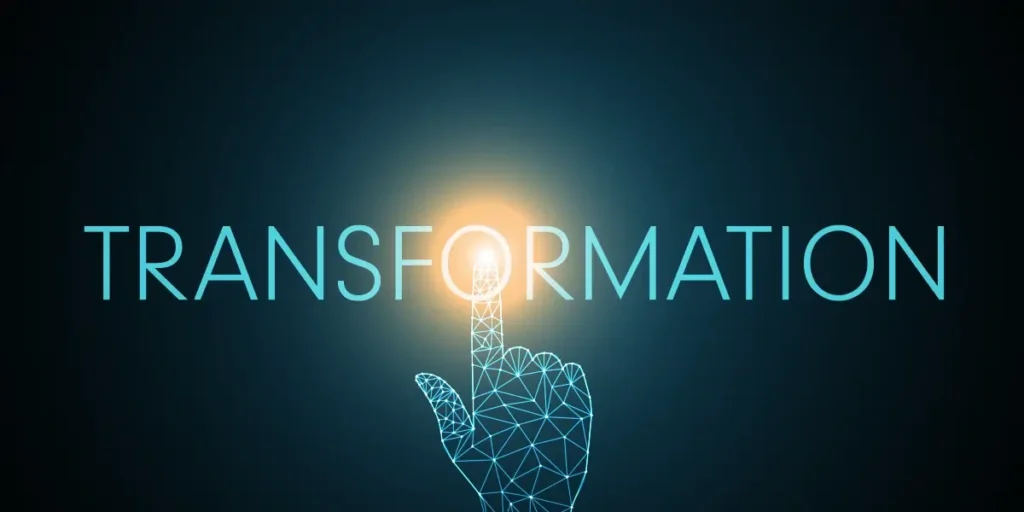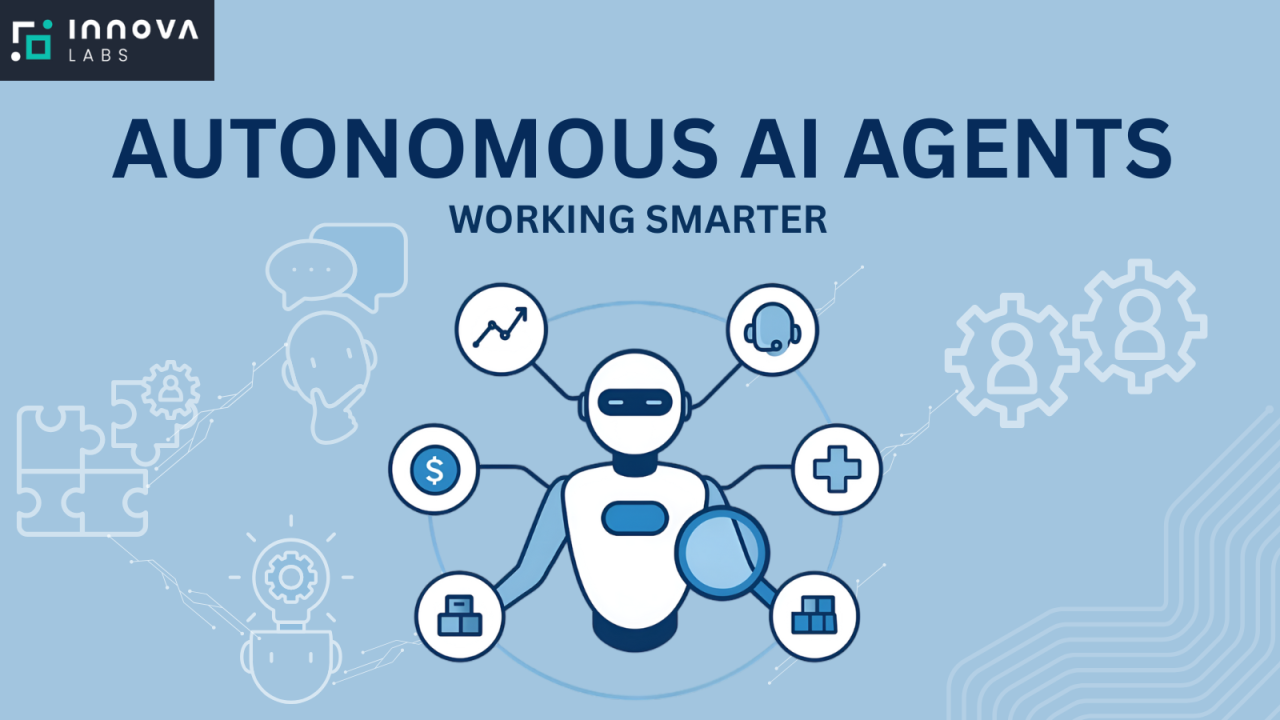Quantum Computing vs Classical Computing
Since the emergence of the first computers, technological advancements have been getting more and more rapid, and we are on the brink of very different times: Quantum Computing. Its name alone is frequently used in scholarly writing, but not many ordinary people completely understand what it refers to and how it differs in regard to gadgets that we use on a regular basis. I will explain the two.
Quantum Computing uses fundamental concepts of quantum mechanics (namely, superposition of states) to calculate. When applied to computational hardware this produces quantum bits, or qubits, which can be in superposition of states, thus enabling potentially exponentially higher computational capacity than classical bits. Therefore, quantum machines will be solutions to otherwise impractical problems that classical machines cannot solve; any solutions to these problems would also not be technically impressive, but also strategic.
Naturally, implementation is a more complicated issue than the above exposition reveals. Qubits quantum states should be immune to external disturbances and quantum operations should take place without decoherence or critical error rates. These constraints put very harsh limitations both on the physical implementation of quantum circuits and on quantum algorithm design. Not many quantum devices can conform to these needs now, although consistent advancements, especially error mitigation, give supporters of large-scale machines in the foreseeable future.
Altogether, Quantum Computing is seen as a paradigmatic change in the computational capability. Although abstract descriptions of its work principals are possible, problems with engineering a practical device cast doubt on when it will be implemented. But their possible consequences are immense: quantum machines have a potential to revolutionize expanses in the sphere of science, technology, even industry.
I would like to draw, in an academic way, the main differences between quantum computing and classical computing. The two styles of calculation are, after all, basically focused toward the same task: to be able to manipulate information in such a way that they provide more than helpful information. However, their functional dynamics, targeted uses or leverages and future prospects are as different as can be.
We start with classical computing which most of the readers are already conversant with. Simplest classical computing refers to a finite number of bits, states 0 or 1 arranged in registers and acted upon by circuits under Boolean logic. The collection of these bits performs what is called in a deterministic fashion; its state at any time is characterized by its configurations, and computation at all later times is completely determined by the current inputs together with the internal rules.
In contrast, quantum computing is based on quantum-mechanically superposable and entangled devices called qubits. Every qubit state represents a continuum of amplitude as opposed to the binary stability of a classical bit. A qubit register consequently accommodates a multidimensional space of configurations, whose majority of states are superpositions of basis states but not the well-known 0 or 1. Such a large dimensionality imparts qubit states with stability against a local perturbation and on the other hand makes them sensitive to global changes in the environment.
The quantum operation is essentially grounded on the existence of a unitary evolution operator, U, which drives superposed states about trajectories of dynamical evolution. The Hamiltonian is a quantum theory postulate whose solution leads to the analytic form of the evolution operator. Through a qubit register, one can hence be brought to identify with the nature of a quantum system, secluded with respect to its environment; its Hamiltonian then dictates the dynamics of the development. The dissipative qubits involve extra terms in the Hamiltonian which pretend system-environment interaction and, in practice, connect the qubit to the environment.
Now we shall take a case of the two paradigms that may be more successful. The high precision, low noise and completed computations with certainty makes the classical computation impossible to beat. This makes it always deterministic something that will, in turn, ensure that a known input permutation will end at a certifiable output, a feature that makes it invaluable in other fields like cryptography and robotics.
Quantum computation however provides new advantages that are uniquely quantum. The most outstanding of these benefits is that it might be possible to provide exponentially quicker answers to some categories of problems, specifically those represented by NP-hard complexity. The canonical example is Shor algorithm: a quantum algorithm which, in principle, can be used to do factorization of large numbers in polynomial time. Better still, quantum speed-ups can frequently be achieved when even the specific problem class is unknown, as long as the Hamiltonian that describes the problem and the targeting of which aspect of its spectrum to get the desired speed-up has an eigenvalue spectrum exhibiting the aspects desired.
There are problems, of course, and there are serious ones. The most dangerous ones include noise and decoherence. In most practical designs, qubit lifetimes are within nanoseconds, compared with the timescale of the quantum evolution. The result being that, the actual quantum machines are open systems, and their coherence is constantly fending off attacks by environmental disturbances. In this case the final state of a qubit can be very different to the desired final state. This in turn requires fault-tolerant schemes which are sophisticated to accomplish the high-fidelity quantum operations.
Still, it is possible to say that quantum machines are developing as early experiments and commercial prototypes indicate. The size of processors is also increasing and currently an IBM 57-qubit processor exists. This, in and of itself, does not appear to provide a measurable speed-up over classical equivalents, but is a convenient testbed by which to test emergent quantum technologies.
In summary, classical computing can be expected to be precise; quantum computing can generate exponentially faster speed in principle. Both paradigms experience frequent scientific enhancements, whereas major challenges remain, the most significant of them being noise control. They are very different in the sphere of predominance and are in different levels of the technical growth.
Table of Contents
-
What is Classical Computing?
-
What is Quantum Computing?
-
Key Differences Between Quantum and Classical Computers
-
How Do Classical Computers Work?
-
How Do Quantum Computers Work?
-
Real-World Applications
-
Quantum Supremacy: What Does It Mean?
-
Challenges in Quantum Computing
-
The Future of Computing: Coexistence or Replacement?
-
Final Thoughts
1. What is Classical Computing?
Classical computing refers to the traditional method of processing information using binary code: 0s and 1s. Every operation, from typing a document to browsing the internet, is broken down into bits. A bit is the smallest unit of data and can either be a 0 or a 1.
Classical computers include desktops, laptops, smartphones, and even supercomputers. They rely on transistors to perform logical operations.
2. What is Quantum Computing?
Quantum computing is based on quantum mechanics, the fundamental theory in physics that describes the nature of particles at the smallest scales.
Unlike classical computers, quantum computers use qubits (quantum bits). A qubit can be both 0 and 1 at the same time, thanks to a property called superposition. This gives quantum computers massive parallel computing power.
3. Key Differences Between Quantum and Classical Computers
| Feature | Classical Computers | Quantum Computers |
|---|---|---|
| Data unit | Bit (0 or 1) | Qubit (0 and 1 simultaneously) |
| Basis | Binary logic | Quantum mechanics |
| Speed | Linear (one at a time) | Exponential (many states at once) |
| Power | Limited by transistors | Potentially much faster |
| Use cases | General-purpose computing | Complex simulations, cryptography, optimization |
4. How Do Classical Computers Work?
At the heart of a classical computer is a central processing unit (CPU) that executes instructions using binary logic.
-
Bits are stored in memory using transistors (on/off switches).
-
Logic gates (AND, OR, NOT) control how bits are processed.
-
The computer runs in a step-by-step process, solving tasks sequentially.
These machines are very effective for tasks like web browsing, document editing, video streaming, and gaming.
5. How Do Quantum Computers Work?
Quantum computers harness the principles of quantum mechanics:
a. Superposition
-
A qubit can exist in multiple states at once.
-
This allows for parallel computations and exploring many solutions at the same time.
b. Entanglement
-
When qubits are entangled, the state of one instantly affects the state of another, no matter the distance.
-
This leads to much stronger computational links between qubits.
c. Interference
-
Quantum algorithms use interference to cancel out wrong answers and amplify correct ones.
Quantum computers use quantum gates, not binary logic gates. These gates manipulate qubits using mathematical matrices, and the calculations they perform are fundamentally probabilistic.
6. Real-World Applications
Classical Computing:
-
Web applications
-
Office productivity
-
Video editing
-
Gaming
-
AI and ML (to a degree)
Quantum Computing:
-
Drug discovery: Simulating molecules and proteins at atomic levels.
-
Cryptography: Breaking or creating unbreakable encryption methods.
-
Financial modeling: Risk prediction and portfolio optimization.
-
Logistics and supply chain optimization.
-
Climate modeling and simulation.
7. Quantum Supremacy: What Does It Mean?
Quantum supremacy is the point at which a quantum computer can perform a task that is practically impossible for a classical computer to achieve in a reasonable timeframe.
In 2019, Google announced it had achieved quantum supremacy using a 54-qubit processor named Sycamore. It performed a task in 200 seconds that would take a supercomputer 10,000 years.
However, critics argue that this task had no practical use. True quantum advantage will be realized when quantum computers solve meaningful, real-world problems faster than classical systems.
8. Challenges in Quantum Computing
Despite its promise, quantum computing faces significant hurdles:
a. Error Rates
Qubits are fragile and prone to errors from environmental noise. Maintaining quantum coherence is incredibly difficult.
b. Scalability
Today’s quantum computers have very few qubits. Building a large-scale, fault-tolerant quantum computer is a huge engineering challenge.
c. Cost
Quantum computers require extreme conditions such as ultra-low temperatures close to absolute zero, making them expensive to maintain.
d. Algorithms
Only a limited number of quantum algorithms exist, and we’re still in the early stages of software development for these machines.
9. The Future of Computing: Coexistence or Replacement?
It’s unlikely that quantum computers will replace classical computers entirely.
Instead, expect a hybrid future:
-
Classical computers for daily tasks.
-
Quantum computers for specific, high-complexity problems in science, finance, logistics, and AI.
Companies like IBM, Google, D-Wave, Microsoft, and Rigetti are racing to make quantum computing mainstream by the 2030s.
Cloud-based quantum computing, like IBM’s Q Experience or Amazon Braket, is already allowing developers to experiment with quantum algorithms using simulators or small quantum processors.
10. Final Thoughts
Quantum computing isn’t science fiction anymore—it’s an emerging reality with the potential to revolutionize how we solve problems too complex for today’s machines.
While classical computers will remain essential for everyday use, quantum computers promise breakthroughs in areas we can barely comprehend right now. As we continue to develop new hardware, algorithms, and error correction techniques, the future of computing will likely depend on synergy between classical and quantum systems.
Quantum Computing vs Classical Computing: What’s the Difference? (Part 2)
Quantum Computing in Practice: Where We Are Now
While quantum computing holds tremendous promise, it’s still in the early stages of development. Here’s a look at where quantum computing currently stands in terms of practical application:
1. Quantum Supremacy
In 2019, Google claimed to achieve quantum supremacy, which means a quantum computer performed a calculation that would be practically impossible for even the most powerful classical supercomputers. Their quantum processor, Sycamore, solved a specific problem in 200 seconds that would have taken a classical supercomputer over 10,000 years.
However, it’s important to note that this problem had no practical application—it was more of a benchmark. Nevertheless, it marked a significant step forward.
2. IBM, Intel, and Others in the Race
Other tech giants like IBM, Intel, and startups like Rigetti and IonQ are making steady progress. IBM’s Quantum System One is available to developers via the IBM Quantum Experience platform, allowing experimentation and learning.
Startups are also exploring photonic quantum computing and topological qubits, which may be more stable and scalable than current approaches.
3. Cloud-Based Quantum Access
Amazon Braket, Microsoft Azure Quantum, and IBM Quantum Services offer quantum computing as a service (QCaaS). Users can run quantum algorithms on simulators or even real quantum hardware from the cloud.
This is vital for students, researchers, and companies to build familiarity with quantum programming before the technology becomes mainstream.
Use Cases: What Can Quantum Do That Classical Can’t?
Let’s break down real-world applications where quantum computers are expected to outperform classical systems:
1. Drug Discovery
Simulating molecular structures accurately is incredibly difficult for classical computers. Quantum computers can simulate quantum mechanical systems, which could accelerate pharmaceutical discoveries and significantly reduce R&D costs.
2. Material Science
Designing superconductors or new materials with atomic precision requires simulating thousands of interacting quantum particles. Quantum computing could be the key to designing materials at the quantum level.
3. Cryptography
Most current encryption relies on the difficulty of factoring large numbers. Shor’s Algorithm on a quantum computer can break these systems in polynomial time, which could render RSA encryption obsolete. Post-quantum cryptography is already being researched as a defense.
4. Financial Modeling
Quantum algorithms could improve risk analysis, option pricing, and portfolio optimization by processing complex probabilistic models faster than classical methods.
5. Logistics and Optimization
Solving the Traveling Salesman Problem, supply chain optimization, and route planning can be exponentially faster using quantum annealing or variational quantum algorithms.
Programming Quantum Computers: How Is It Done?
Unlike classical computers that use binary instructions and languages like Python or C++, quantum programming involves a whole new set of principles and tools.
1. Quantum Programming Languages
-
Qiskit (IBM): Open-source framework using Python
-
Cirq (Google): Designed for NISQ devices (Noisy Intermediate-Scale Quantum)
-
Q# (Microsoft): Specialized quantum programming language
These platforms allow users to build and test quantum circuits, simulate qubit states, and run code on real or virtual quantum machines.
2. Quantum Circuits
A quantum program is typically structured as a quantum circuit—a sequence of quantum gates applied to qubits. Gates like Hadamard (H), Pauli-X, and CNOT replace the classical logic gates.
3. Hybrid Algorithms
Many real-world tasks require a hybrid quantum-classical approach, where a classical processor works alongside a quantum co-processor. Variational Quantum Eigensolvers (VQE) and Quantum Approximate Optimization Algorithm (QAOA) are examples of hybrid models.
Challenges in Quantum Computing
Despite its promise, quantum computing faces several hurdles:
1. Decoherence and Noise
Qubits are sensitive and can lose their quantum state due to interaction with the environment—a process called decoherence. Even a minor temperature fluctuation can disrupt computations.
2. Error Correction
Quantum error correction is vital but complex. Unlike classical bits, qubits cannot be copied due to the no-cloning theorem, making error correction far more challenging.
3. Scalability
We need thousands (or millions) of stable qubits to solve real problems, but current systems operate with just tens or hundreds. Fault-tolerant quantum computing remains a long-term goal.
4. Cost and Infrastructure
Quantum computers require extremely low temperatures (close to absolute zero) and are expensive to build and maintain. Only a few labs and corporations currently have access.
Quantum vs Classical: Who Will Win?
In reality, quantum computing won’t replace classical computing, but will complement it. Think of it like this:
-
Classical computers will continue to be used for day-to-day tasks, browsing, gaming, and most enterprise workloads.
-
Quantum computers will be used for specialized problems that involve large-scale simulations, probabilistic modeling, or combinatorial optimization.
It’s less about competition and more about coexistence in a hybrid computational ecosystem.
The Future of Quantum Computing
1. Commercialization
We’ll see commercial quantum computing emerge in industries like logistics, finance, and healthcare within the next decade. Companies like Zapata, Quantinuum, and Xanadu are already developing solutions.
2. Quantum Internet
Efforts are underway to build a quantum internet for ultra-secure communication using quantum key distribution (QKD).
3. Post-Quantum Cryptography
Governments and institutions like NIST are standardizing post-quantum cryptography to safeguard digital systems from future quantum threats.
4. Quantum-AI Integration
The fusion of Quantum Computing and AI could result in next-level intelligence. Quantum-enhanced machine learning (QML) could solve classification, pattern recognition, and training tasks faster.
Final Thoughts
The gap between classical computing and quantum computing is not just technological—it’s conceptual. While classical computers process information sequentially or in parallel using deterministic bits, quantum computers operate in a world of probabilities, entanglement, and superposition.
While quantum is not ready to dominate yet, the foundations being laid today are expected to lead to a revolution in the coming decades. For researchers, students, and enthusiasts, now is the time to learn, experiment, and prepare for the quantum future.






